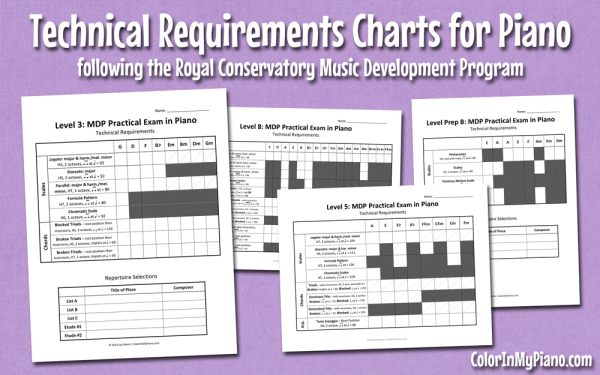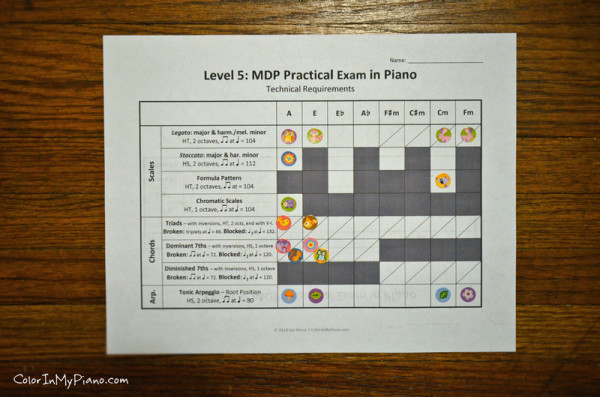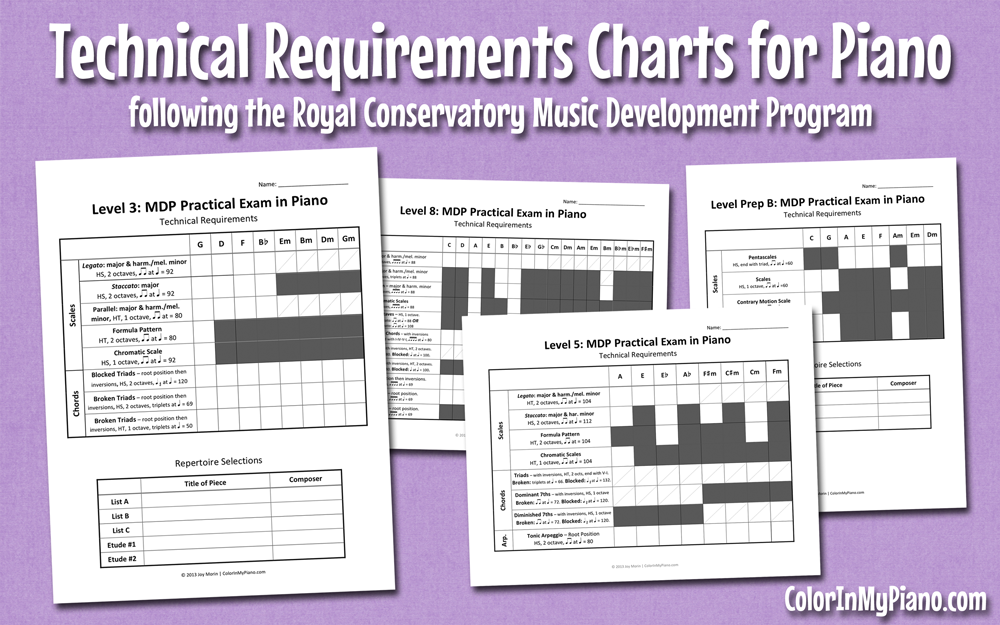UPDATE: Please visit this post for the latest 2022 RCM Piano Syllabus version.
Today, I’m sharing a project that I have been working on extensively for the past three weeks. I am very excited to have this project complete and be able to share it with you!

For the last two years, I have entered a couple of students in the Royal Conservatory’s Music Development Program (previously known as The Achievement Program and the National Music Certificate Program in the U.S.). It is an excellent program that I hope to continue to use with my students. Preparing for the practical exams has been a positive experience for my students.
As a newcomer to the MDP, I found it challenging to keep track of the technical requirements with my students. I found myself pulling out the MDP Piano Syllabus at every single lesson in order to clarify something or check if we were doing things right. And writing out the technical requirements on my students’ assignment sheets each week was time consuming, especially since I expected my students to review each previous weeks’ material.
(Yes, I am aware that Frederick Harris sells books containing the notated technical requirements for each level of the MDP. However, I personally prefer to teach scales/arpeggios/chords by rote rather than having students read the notation. Those books are a great reference for teachers, though.)
To help my students and me keep track of our progress through the technical requirements, I started creating charts using Microsoft Publisher. I gave a printed copy of the chart to the student to take to and from lessons. As we completed each requirement, we placed a sticker or a checkmark in the box. The chart made it MUCH easier for us to keep track of our progress through the requirements. And I found that my students were more motivated to practice the technical requirements since they could visually track and see their progress.

I kept working on the charts until I completed the levels Prep A through Level 10.
That was over three months ago. I did not dare share the charts until I felt confident they were clear and (hopefully) mistake-free. Fortunately, a recent thread in a piano teachers’ forum kicked me into gear again on this project. With the help of two other piano teachers, all of the charts were revised and proofed further. (A huge THANK YOU goes to Donna Gross Javel and Deborah Rhine for their work on this project. I could not have completed this project without their help!)
Time for my disclaimer: Please understand that these charts CANNOT function as a replacement for the MDP Piano Syllabus — they are merely practice guides. Although the charts have been proofread extensively against the 2008 Piano Syllabus of the Royal Conservatory Music Development Program, there is still the possibility that the charts contain errors. If you use these charts, please be sure to confirm your students’ progress against the syllabus to ensure that your student is meeting the requirements properly. Please send me an email if you think you have found a mistake so that I can make corrections.
Even if you have no interest in the MDP, you may nevertheless find the charts useful for your students.
Download:
I hope these charts make your life a little bit easier! You can download the free pdf by visiting the Printables > Other Resources page and scrolling down to “MDP Technical Requirements Charts.”
UPDATE: New charts are available for the new 2015 Piano Syllabus. Click here.



Thank-you for doing this, Joy. I started something like this more than ten years ago and then babies happened. 🙂 This is a resource I am going to print and use. The investment of your time is GREATLY appreciated!
I’m glad you can make use of the charts, Rebekah!
Thank you! These are great.
These are great! Can I share these on my website with a reference to you?
Yes, of course — please feel free to!
Thank you very much for sharing these forms. I have been searching for technique accomplishment sheets, but never found anything. A technique accomplishments spreadsheet, by ability level, was on my to-do list, but I hadn’t managed to finish it! I like the layout of your forms, rather than having to refer to the table of contents of the official technique books.
Keep up the excellent work – when do you find time to teach??
These are a great idea. I think they’re also useful for people learning piano on their own. I’ll be linking to this! 🙂
These are so awesome!!!!!!!! I feel like I’m always pulling out the syllabus too, and it’s too slow!! I love it. I can put these in their binders. Thanks!!!!!!!!!!!
I was just thinking of making the same chart myself! You’re always one step ahead of me! I did a chart for our state’s assessment program but it’s not as detailed so I want to use the MDP assessment next year for my students. Thanks!
Thank you, thank you for these! What a fantastic resource! I have never been involved with RCM, but I was researching ideas for a technique checklist format when someone pointed me here. I will be thrilled to use these! Thank you again!!
This is great!
I have made charts that’s similar to yours but I like yours better, especially the grey blocks. The grey blocks allow the student to see what keys/scale they have yet to learn, etc.
Thank you for making this!
Hi Joy, I love these charts! I’ve been using them with all of my students and they love keeping track of their progress. Are you going to be updating them for the new Syllabus that just came out?
Yes, I haven’t gotten to it yet, but I do plan to create a new version for the 2015 syllabus!
Oh thank you, thank you in advance! (technical requirement charts for the 2015 syllabus) Your charts are so helpful! My students love them. Thanks, Joy!!!
This season is my first time taking a student through any rcm exam. I am feeling the strain of time management. Are there any suggestions out there for how to structure lessons for exam prep?
Thanks for sharing your wonderful work! As I’m a French person, I was wondering what MDP means? Master Development Plan? Not sure…
Hi Cynthia! MDP stands for “Music Development Program”, which is name RCM previously used for the U.S. based version of their program. They’ve renamed the program a number of times over the years, but I believe they now stick to just calling it “RCM”. 🙂